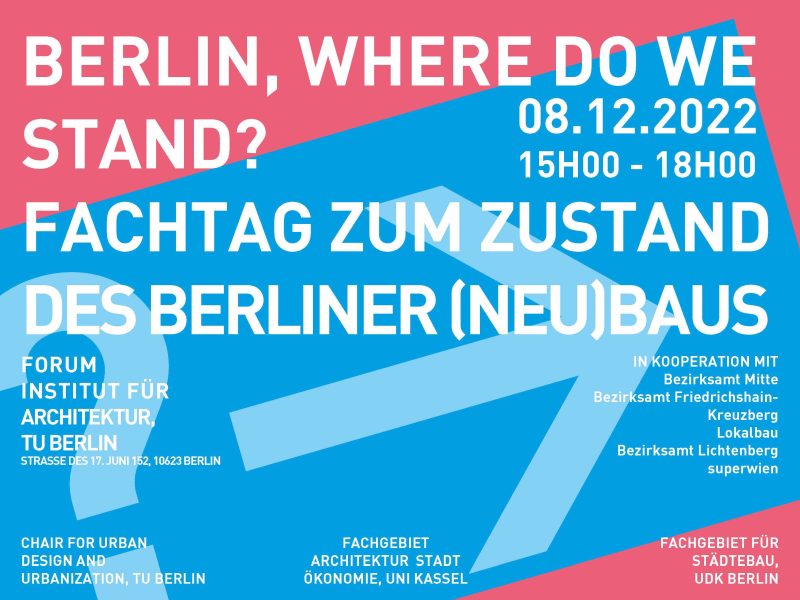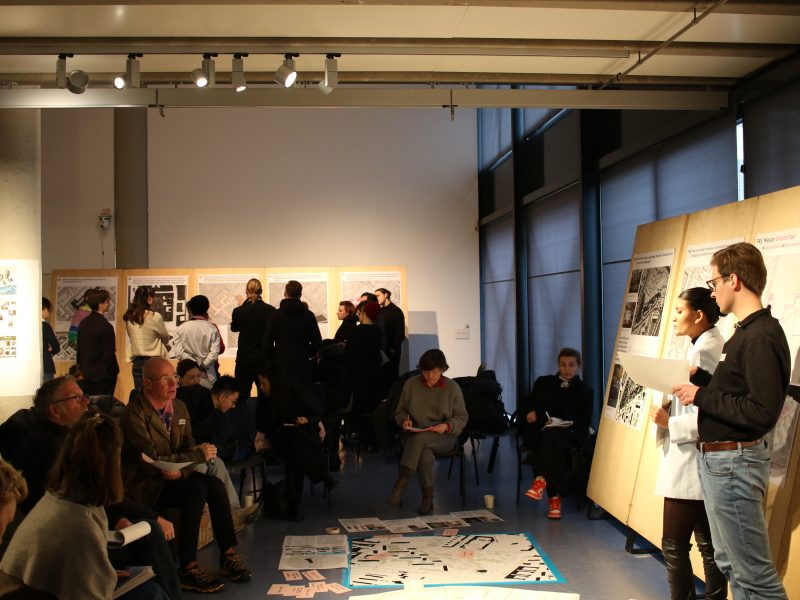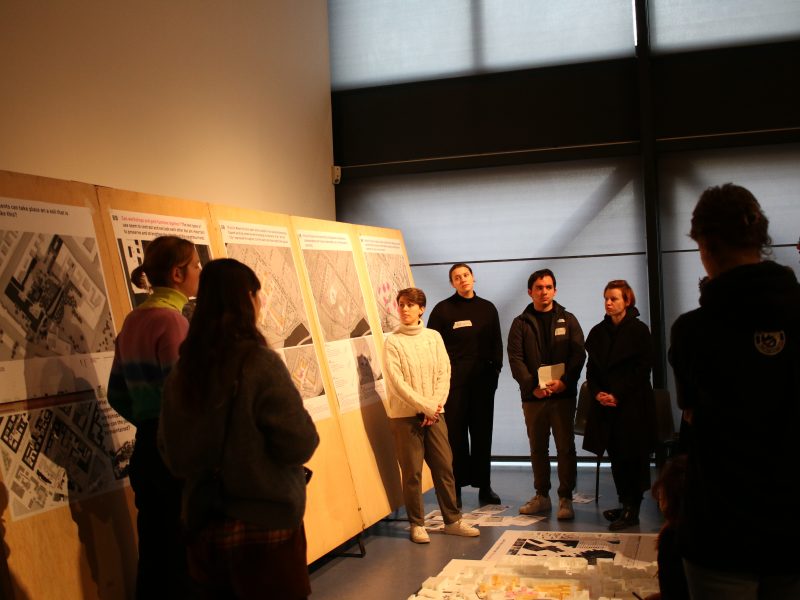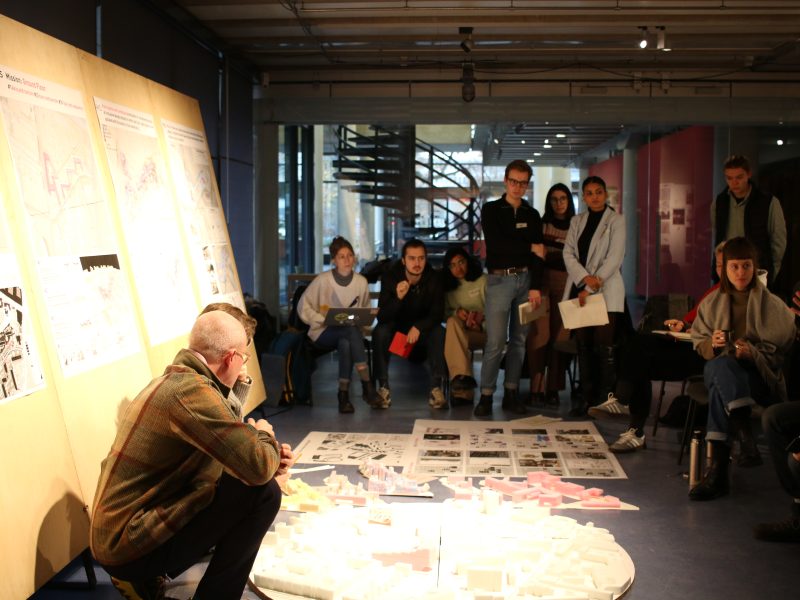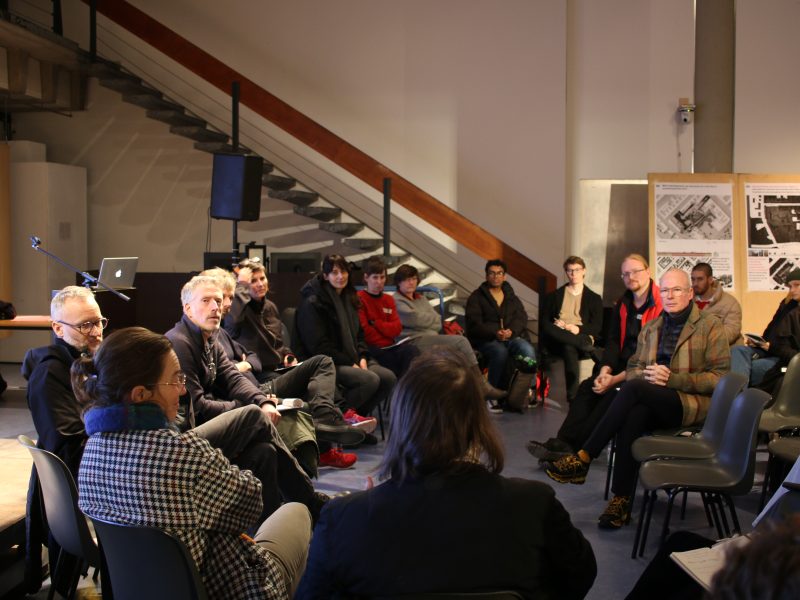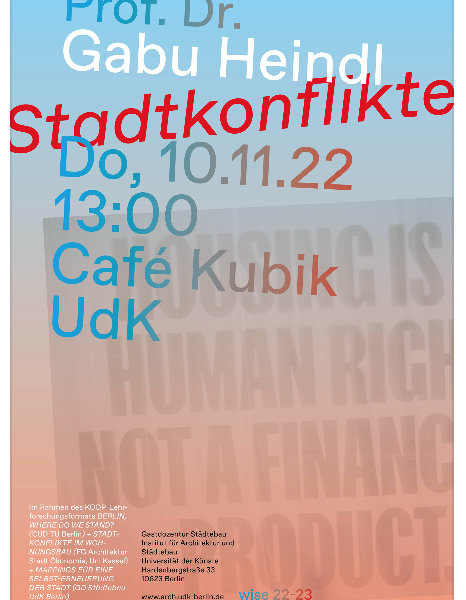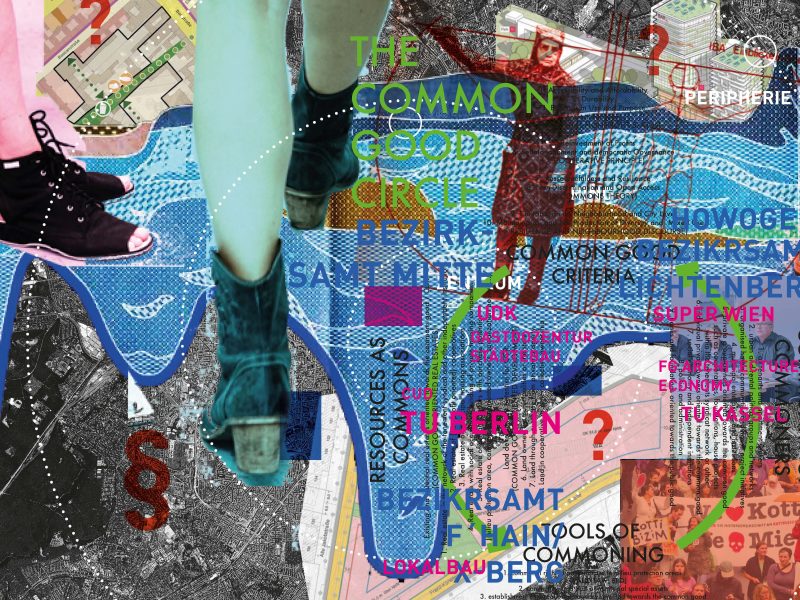Spatial Commons (15) - Berlin, where do we stand?
Fachtag zum Zustand der kommunalen Stadtentwicklung und des Berliner (Neu)Baus
Teaching
Das Fachgebiet für Städtebau und Urbanisierung (CUD), TU Berlin, das Fachgebiet für Architektur Stadt Ökonomie, Universität Kassel, und die Gastdozentur für Städtebau, Universität der Künste Berlin, bearbeiten in einem interdisziplinären kooperativen Lehrforschungsformat drängende Fragen der Berliner Stadt und (Neu)Bauentwicklung. Anhand von ‚Kernbohrungen’ an drei wichtigen Berliner Stadtentwicklungs-/ (Neu)Bauvorhaben wollen wir über Werkzeuge und Instrumente der gemeinwohlorientierten Planung diskutieren. Wir möchten den Status Quo mit zukünftigen Fragestellungen und Möglichkeiten abgleichen und zukunftsfähige Entwicklungsmöglichkeiten aufzeigen. Die Rolle der Kommune ist hier, den Interessenausgleich herzustellen und möglichst zügig eine integrative, diverse und partizipative Entwicklung.
In unserer Arbeit betrachten wir durch kommunale Akteur*innen entwickelte Prozesse, aber auch Prozesse in denen kommunale Akteur*innen die Rahmenprozesse in Richtung von mehr Teilhabe und Partizipation vorgeben (wollen). Der kritische Blick richtet sich auf Mitgestaltung durch Nutzer*innen und Betroffene einerseits der Prozesse, aber auch der Räume und Nutzungen, die entstehen und möglichst langfristig gemeinwohlorientiert erhalten bleiben, sowie ökonomisch und bezüglich der öffentlichen Belange tragfähig sein sollen.
In diesem Spannungsfeld wollen wir diskutieren:
> Wie kann Wohnbau sowohl in Struktur als auch in Fördermöglichkeiten flexibel gedacht werden und gleichzeitig Gemeinschaft und ein Ankommen und Bleiben ermöglichen?
> Wie können gemeinschaftliche und soziale Einrichtungen mitgedacht, in Regelwerke übersetzt und finanziert werden?
> Was bedeutet Freiraum und Erdgeschoßprogrammierung auf sozialer und ökologischer Ebene?
> Was heißt Diversität und wie können sich Räume dafür öffnen lassen?
> Wie kann Gewerbe, Soziales, Kultur und Wohnen zusammen gedacht werden um Nachbarschaften inklusiv und sozial zu entwickeln?
> Wie können in den verschiedenen Bezirken vorhandene Instrumente so eingesetzt werden, dass Bauen auch unter Zeitdruck eine breite Beteiligung erfährt?
WANN?
Donnerstag, 8. Dezember 2022, 15h00 – 18h00
WO?
Institut für Architektur TU Berlin (Forum im Erdgeschoss), Straße des 17. Juni 152, 10623 Berlin / U-Bahnhof Ernst Reuter Platz
WER?
Kooperationspartner*innen: Mathias Heyden, Bürger*innenbeteiligung & Vernetzung, AKS Gemeinwohl verwaltungsintern, Abt. Bauen, Planen, Kooperative Stadtentwicklung, Bezirksamt Friedrichshain Kreuzberg / Magnus Hengge und Konrad Braun, LokalBau-Team, im Auftrag des Bezirksamts Friedrichshain Kreuzberg / Charlotte Weber, ASUM GmbH, vom Bezirksamt Friedrichshain Kreuzberg beauftragt mit „Beteiligungsverfahren zum integrativen Quartierszentrum Franz-Künstler-Straße“ / Leonardo Freitag, Bezirksamt Mitte, Stadtentwicklungsamt – verbindliche Bauleitplanung/ Josephine Templin-Kobayashi, Bezirksamt Mitte, Stadtentwicklungsamt – Sanierungsverwaltungsstelle / Jan Schlaffke, Bezirksamt Mitte, Stadtentwicklungsamt – Sanierungsverwaltungsstelle/ Roland Krebs, Lena Diete, superwien, Architekt*innen, Masterplan Neues Zentrum Hohenschönhausen / Monika Kuhnert, Leiterin des städtebaulichen Verfahrens Neues Zentrum Hohenschönhausen / Mike Müller, Bürgerverein Neu-Hohenschönhausen
Weitere Gäste: Florian Schmidt, Stadtrat/Dezernent Abt. Bauen, Planen, Kooperative Stadtentwicklung, BA Friedrichshain Kreuzberg / Rainer Johann, Projektleiter Wohnungsneubau, HOWOGE Neu- Hohenschönhausen /
Unsere jahrelange Erfahrung in Kooperationsprojekten mit der Berliner Planung hat gezeigt, dass wir als Universität in unserer Auseinandersetzung mit konkreten Orten und den dortigen Prozessen wichtige Erkenntnisse an die Praxis zurückgeben und diese in einen fruchtbaren Austausch bringen können. Auch aus der Geschichte Berlins und den historischen Erfahrungen bezüglich oben genannter Fragen wollen wir lernen und unser Wissen an Sie weitergeben. Wir möchten Sie herzlich dazu einladen, mit uns zu diskutieren.
Prof. Jörg Stollmann, Anna Heilgemeir, Julia Köpper, Roberta Burghardt, Fachgebiet für Städtebau und Urbanisierung, TU Berlin
Prof. Dr. Gabu Heindl, Iva Marčetić, Nina Manz, Florine Schüschke, Fachgebiet Architektur Stadt Ökonomie Universität Kassel
Dr. Dagmar Pelger, Gastdozentur für Städtebau, UdK, Berlin
